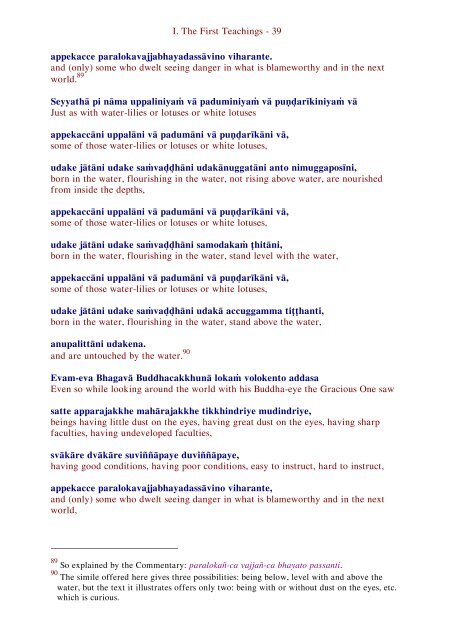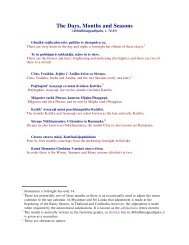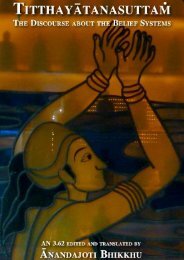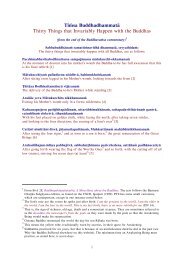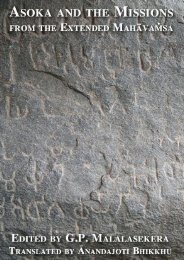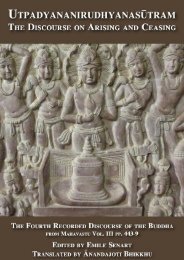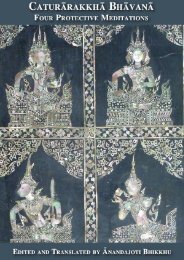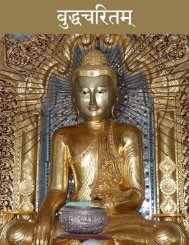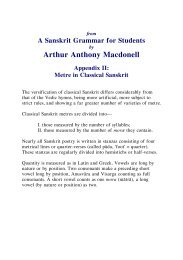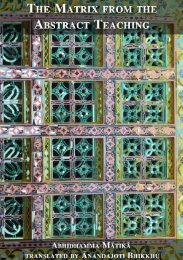MahÄkhandhako The Great Chapter - Ancient Buddhist Texts
MahÄkhandhako The Great Chapter - Ancient Buddhist Texts
MahÄkhandhako The Great Chapter - Ancient Buddhist Texts
You also want an ePaper? Increase the reach of your titles
YUMPU automatically turns print PDFs into web optimized ePapers that Google loves.
I. <strong>The</strong> First Teachings - 39<br />
appekacce paralokavajjabhayadassāvino viharante.<br />
and (only) some who dwelt seeing danger in what is blameworthy and in the next<br />
world. 89<br />
Seyyathā pi nāma uppaliniyaṁ vā paduminiyaṁ vā puṇḍarīkiniyaṁ vā<br />
Just as with water-lilies or lotuses or white lotuses<br />
appekaccāni uppalāni vā padumāni vā puṇḍarīkāni vā,<br />
some of those water-lilies or lotuses or white lotuses,<br />
udake jātāni udake saṁvaḍḍhāni udakānuggatāni anto nimuggaposīni,<br />
born in the water, flourishing in the water, not rising above water, are nourished<br />
from inside the depths,<br />
appekaccāni uppalāni vā padumāni vā puṇḍarīkāni vā,<br />
some of those water-lilies or lotuses or white lotuses,<br />
udake jātāni udake saṁvaḍḍhāni samodakaṁ ṭhitāni,<br />
born in the water, flourishing in the water, stand level with the water,<br />
appekaccāni uppalāni vā padumāni vā puṇḍarīkāni vā,<br />
some of those water-lilies or lotuses or white lotuses,<br />
udake jātāni udake saṁvaḍḍhāni udakā accuggamma tiṭṭhanti,<br />
born in the water, flourishing in the water, stand above the water,<br />
anupalittāni udakena.<br />
and are untouched by the water. 90<br />
Evam-eva Bhagavā Buddhacakkhunā lokaṁ volokento addasa<br />
Even so while looking around the world with his Buddha-eye the Gracious One saw<br />
satte apparajakkhe mahārajakkhe tikkhindriye mudindriye,<br />
beings having little dust on the eyes, having great dust on the eyes, having sharp<br />
faculties, having undeveloped faculties,<br />
svākāre dvākāre suviññāpaye duviññāpaye,<br />
having good conditions, having poor conditions, easy to instruct, hard to instruct,<br />
appekacce paralokavajjabhayadassāvino viharante,<br />
and (only) some who dwelt seeing danger in what is blameworthy and in the next<br />
world,<br />
89 So explained by the Commentary: paralokañ-ca vajjañ-ca bhayato passanti.<br />
90 <strong>The</strong> simile offered here gives three possibilities: being below, level with and above the<br />
water, but the text it illustrates offers only two: being with or without dust on the eyes, etc.<br />
which is curious.


